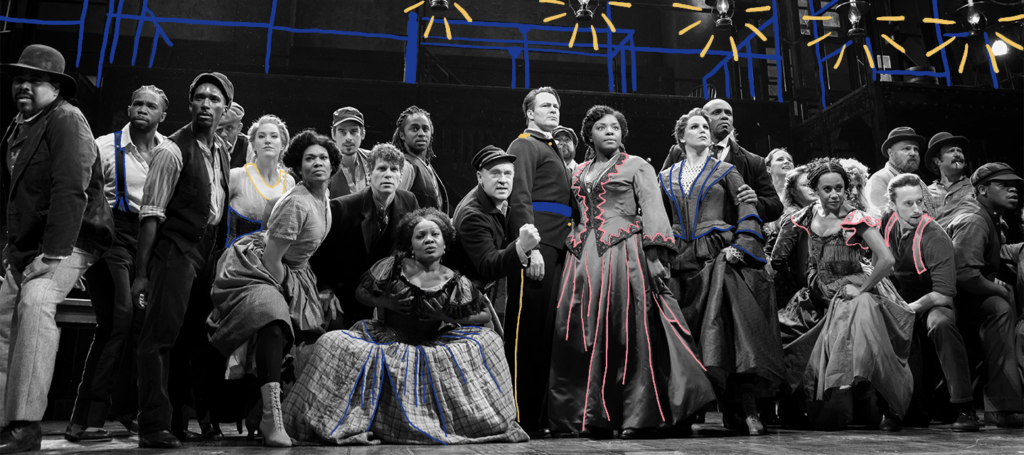


‘Paradise Square’ Packs Valuable Lessons in Old-Fashioned, Familiar Wrapping
Ensembles of Black and immigrant communities sing about the difficulties of living in a changing America. A group of people stand in a triangle formation and protest. Black and white people compete against each other in a racially and politically charged dance contest. No this isn’t Ragtime, Les Mis, or Hairspray. It’s Paradise Square, a new musical about the Five Points neighborhood in New York City, in which Irish immigrants and Black Americans lived together in peace (until they didn’t).
The musical based on historical events that occurred during the Civil War, including the infamous Manhattan Draft Riots, at times comes across as a recycled version of the aforementioned protest musicals. Welcome to the 1860s, indeed.
The connections to these earlier, highly successful shows, do not end at mere plot summary, and the connections are no coincidence. Paradise Square clearly draws from what was so alluring about those shows: the massive ensembles, the slew of large dance numbers, the anthemic songs, the huge scope, the rally calls. Because of this, Paradise Square feels more like a musical from the 1990s than from the 2020s.
On the surface this isn’t entirely a bad thing: many of us love Ragtime, Les Mis, and Hairspray. However, we’ve seen those shows already, and musical theater has grown and changed since then, which makes this latest iteration of a similar narrative feel a bit too familiar–and dare I say old-fashioned.
Looking at the lone lamppost on the playbill and marquee, you likely wouldn’t know what Paradise Square is about. Oddly enough, the musical itself, despite an elaborate set (by Allen Moyer) does not feature a single lamppost. The lamppost remains an enigma; I only wish we had had a lamppost to illuminate the show’s unclear goals.
This could be a “too many cooks” situation: there are three book writers, two lyricists, a composer, a conceiver/writer/additional composer, a director, a choreographer, someone who did musical staging, and the show “is inspired in part by the songs of Stephen Foster.” Much like the various communities in the musical, who could work in harmony but end up pitted against each other, the book, score, direction, choreography, and design, despite being strong on their own, cannot manage to seamlessly work together.
The vast majority of songs do not advance the plot but completely stop the action, often for a dance break. The few songs that contain important information are briefly summarized in a single line or two immediately after the singing is over, often making the songs themselves unnecessary, however enjoyable they might be. During several of the most important thematic moments in the show–such as the paired songs in which the Black ensemble sing that they wish they could be soldiers and that the North has to win the war so slavery will end, while the Irish sing that they don’t want to die in a war for a country that doesn’t care about them–the lyrics get lost amid the dancing. The choreography by Bill T. Jones is outstanding, entertaining, and well-executed by the ensemble, but the writers and director did not space out the dance sequences enough. The show has several dance battles, though with diminishing returns, and it sometimes feels repetitive.
Likewise, though there are many important themes–the disenfranchisement of both Black people and immigrants, the separate (dis)investments the groups had in the Civil War, the cultural appropriation, exploitation, and misrepresentation of enslaved peoples’ experiences by Stephen Foster, famous composer of “happy plantation songs”–the show cannot explore them all adequately. Paradise Square tries to do it all and spreads itself too thin.
While some of the appeal of the show is its size and scope, the design of the musical feels misguided. The old-fashioned New York scaffolding set, which looks much like that of Newsies or Ragtime, spins, rotates, and reconfigures–but all the motion is superfluous. Most egregiously, the lighting design by Donald Holder includes confounding and distracting elements, such as a row of hexagon LED concert lights that remain visible throughout the entire show.
Issues aside, there is undeniably a lot to enjoy in Paradise Square. The musical features a talented ensemble led by the powerhouse Joaquina Kalukango (as Nellie, the owner of the tavern where the majority of the action takes place) and the nimble A. J. Shively (as Owen, a masterful dancer Irish immigrant terrified of getting drafted). It is chock-full of impressive dance numbers that pair the percussive rhythmic step dances of the Irish and Black communities. The score is catchy (especially the title song), compelling, and feels period-specific (heavily featuring the fiddle) while appealing to a modern musical theater ear. The highlight of the show is without a doubt “Let it Burn,” Kalukango’s 11 o’clock number, which receives a standing ovation and will be canonized alongside the greats like “I’m Here,” “Lot’s Wife,” and “Rose’s Turn.”
Paradise Square may not be a great musical, but it is certainly not bad either. If nothing else, it is significant to have a musical on Broadway exploring the complex contours of race in American history–especially in our current moment where teaching such themes and histories is trying to be censored. Paradise Square is not going to change the history of musical theater, but perhaps that too is too lofty a goal for every new musical. Sometimes, we just want a good time and maybe even a good lesson.
Keep Reading

An Evening Spent at Home Beats a Night at this “Plaza Suite”
What does it say about our society that Plaza Suite, the first Neil Simon play to return to Broadway in over 11 years, and the first since his death in 2018, is a middling affair buried in milquetoast acting with inept direction? During his heyday, Simon defined what Broadway comedy meant. Nicknamed “Doc,” for his […]
Read More
‘Confederates’ Mightily Walks Down the Elusive Road to Freedom
Time sways back and forth like a Newton’s Cradle in Dominique Morisseau’s new biting comedy Confederates, where the differences between understanding, or experiencing racism from a historical, intellectual context, and being confronted with it in a visceral way, become stark clear. The play tackles the subject of slavery in the raw, as well as its […]
Read More












